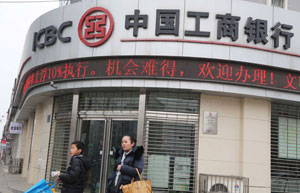The ongoing sixth China-UK Economic and Financial Dialogue has seen the two sides in similar spirit but with different expectations. Both sides believe the dialogue will promote bilateral trade and investment ties, strengthen macroeconomic policy coordination, boost the financial sector's development and cooperation, and support global economic recovery.
But their expectations are different. China, to begin with, expects that more Chinese banks would soon be allowed to open branches in the UK. Since the 2008 global financial crisis, the Financial Services Authority - the United Kingdom's financial services regulator - has made it more difficult for foreign banks to set up branches in the country, because the authority has less control over them. As opposed to branches, which are offshore arms of foreign banks, subsidiaries are subject to the capital requirements that apply to Britain's local banks. Little wonder, only Bank of China has a branch in London, although China's main banks have set up office in the city.
Discussions on allowing Chinese banks to open branches in the United Kingdom have been heated in recent years. And China boosted it as in June, China Construction Bank, China's second-largest lender, was selected as the first clearing service provider for yuan trading in London.
If the only reason that the FSA is not giving permission to Chinese banks to open branches in the UK is the risk of bankruptcy, it could discuss the issue with the China Banking Regulatory Commission, China's top banking regulator, about how to rule out such a possibility.
China's second expectation from the dialogue is on the trade front. The UK is China's second-largest trading partner in the European Union; their two-way trade reached $70 billion last year. Since China has embarked on the journey of sustainable development, it wants the UK to promote and facilitate bilateral high-tech trade. Also, China expects the UK to grant it full market economy status as early as possible and influence the EU leadership to do the same.
China's global trade has expanded rapidly since it joined the World Trade Organization, but its exporters have also had to face an increasing number of trade disputes primarily because advanced countries don't consider the country to be a full market economy.
The UK, on its part, expects London to become the main offshore trading hub for the yuan. The offshore yuan market has grown dramatically since China began to internationalize its currency in earnest in 2009. The confidence Britain has in the yuan prompted it to make London the first offshore yuan center in the Western world. London has inherent advantages as an offshore yuan hub because of its developed foreign exchange, derivatives and capital markets, a sound legal and regulatory environment, and its unique time zone. Indeed, London has made efforts to boost the yuan business, and its financial players have worked to develop new yuan products.
The British government's second expectation is to attract more Chinese investment. In the past two years, Chinese companies have invested more than $13 billion in the UK, which is more than the combined amount invested in the previous 30 years. Since Chinese investments have created new jobs and boosted the local economy, the British government is seeking to attract more Chinese investments.
Perhaps it can be said that the different expectations of the two sides are interconnected. For example, if more Chinese banks open branches in the UK, they can help London become the leading hub of offshore yuan trading. And as British companies strengthen their trade and investment links with China, and as China's trade grows by the year, the yuan will become an important global invoicing currency.
And once London becomes the leading offshore yuan trading hub, it will genuinely raise the demand for the Chinese currency.
The author is a correspondent of China Daily based in London.
 |
 |
| ICBC receives UK branch licence since regulation change | Clearing facility to support London's renminbi business |
